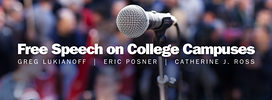Lead Essay
Greg Lukianoff reviews the recent media attention to cases of speech suppression on college campuses. He agrees that they are troubling, but notes that they aren’t all that new: Political correctness and expansive speech codes were widespread in the 90s, and most of those codes never disappeared. Lukianoff traces their origins to the federal Department of Education’s Office for Civil Rights, which has significantly confused administrators and students about the prevailing law in these matters. Administrators in particular want expansive speech codes because such codes shield them from legal liability. Lately, though, students have begun to demand them too, in the hope of suppressing hate speech and so-called microaggressions.
Response Essays
Speech codes may sound menacing, but they are actually designed to enhance speech, writes Eric Posner. No classroom instructor tolerates rudeness or disruption of the learning environment, and speech codes are an outgrowth of this laudable practice. Administrators, too, are less guilty than it may seem by relying on Greg Lukianoff’s anecdotes: They have not been punishing students merely for their speech. Universities face a difficult task, in that they must accommodate highly diverse student cohorts with wildly divergent ideas, all while preserving an atmosphere of collegiality and of learning. It is inevitable that mistakes will arise. These mistakes, though, do not indicate any sinister trend about American education or public life. Would an absolutist free-speech policy do better at educating college students? That’s an empirical claim, and one that Lukianoff does not even try to substantiate.
Catherine J. Ross argues that the issue of free speech on college campuses is far more nuanced than either side seems willing to admit. We have become much more aware of the problem than previously, thanks in part to social media and the efforts of advocates like Greg Lukianoff, who rightly points out some troubling examples here. And yet there is room for exaggeration: Eric Posner is certainly onto something, she writes, that Lukianoff exaggerates the severity of the problem. Ross searches for evidence in both directions and concludes that a chilling effect has clearly been at work in recent years. Professors should never feel as though their students scare them; students should not be scared of one another. The crux of the matter, as she puts it, is that liberals have recently been divided: Some have kept to their traditional First Amendment commitments, while others have come to prefer equality in many instances where equality and freedom of expression appear to conflict.
The Conversation
Letters to the Editor
Coming Up
Discussion to follow through the end of the month.
Related at Cato
Commentary: ”Not on My Dime” by Neal McCluskey; “Free Speech on College Campus” by Emily Eakins, December 1, 2015
Podcast: ”Campus Censorship and the End of American Debate” with Greg Lukianoff, August 18, 2014
Policy Analysis: “Attack of the Utility Monsters: The New Threats to Free Speech” by Jason Kuznicki, November 16, 2009

